探究海外研修 inバリ!(day3~4)
- 宿泊行事
- 探究
- 国際交流・海外研修
- 行事報告
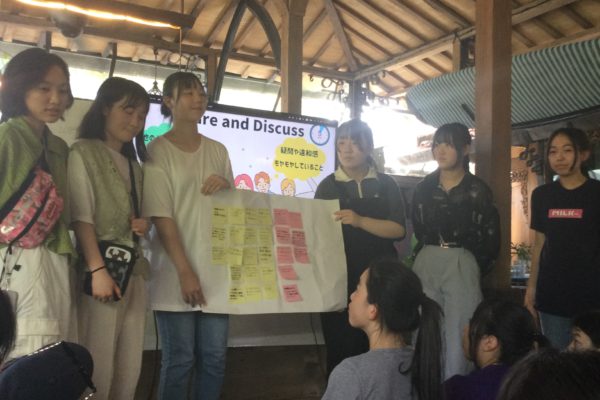
Today we kept researching based on the group; “water issues,”“garbage issues,”and“agricultural issues.”
As the activities progressed, the students came to think that the issues of water, waste, and agriculture are all connected.
All teams visited ‘Jiwa Garden,’ where they learned about ‘permaculture’, the concept of utilizing land, resources, people and the environment in a manner that doesn’t produce any waste.(HP: https://www.jiwagarden.com/)
Here, they make compost from leftover food and use water purification techniques, which eventually leads to no waste.
By seeing the perfect cycles of ecosystems, the students started wondering , “What is the definition of ‘waste’?”
from a student in the agricultural team
There are many differences in agriculture between Bali and Japan. For example, there are many different types of crops, and the methods and systems to make them are all different. At Jiwa Community Garden, we learned about biogas and composting systems, and felt the circulation of energy throughout the facility. Finally we realized that the water and waste problems are also connected to agriculture. I interviewed people working there and was inspired by their enthusiasm to get the environment sustainable.(Waka Domoto)
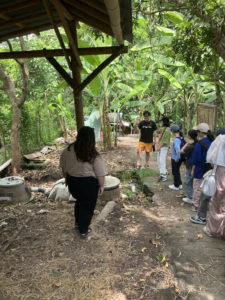
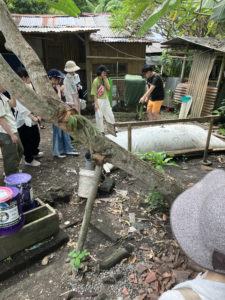
All teams are thinking about what they can do by repeating hypotheses and testing.
All students tried very hard to communicate with local people in English.
In the evening, we watched Kecak dance, one of the three major Balinese dances.
Tomorrow is the last day of this program.
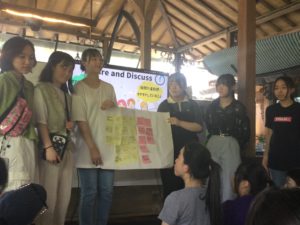
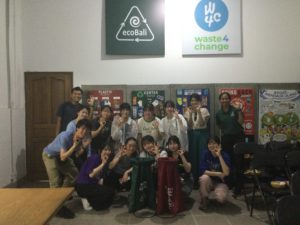
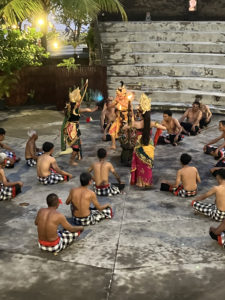
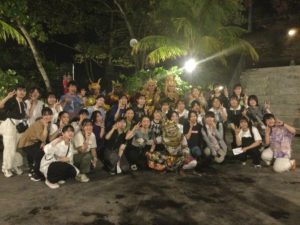
I want all the students to draw their own conclusions and move on to the next one.
Attending teacher Hideki iri
(今日も 「水問題」「ゴミ問題」「農業問題」チームに分かれて探究活動を行いました。
活動を進めるうちに、生徒たちは水、ゴミ、農業の問題はすべてつながっていると考えるようになりました。
チーム全員が「Jiwa Garden」を訪問し、土地、資源、人、環境を無駄なく活用する考え方「パーマカルチャー」について学びました。(HP:https://www.jiwagarden. com/)
ここでは、残飯から堆肥を作り、水の浄化技術を利用することで、最終的に無駄を出さないようにしています。
生態系の循環を目の当たりにし、生徒たちは「『ゴミ』の定義って何だろう?」と考え始めました。
以下、農業チームの生徒より
バリと日本の農業には多くの違いがあります。 例えば、作物にはたくさんの種類があり、作る方法やシステムもすべて異なります。 Jiwa Gardenでは、バイオガスや堆肥化システムについて学び、施設全体のエネルギーの循環を体感しました。 最後に、水と廃棄物の問題も農業に関係していることに気づきました。 そこで働く人々にインタビューし、環境を持続可能なものにしようとする彼らの熱意に刺激を受けました。
仮説と検証を繰り返しながら、どのチームも何ができるかを考えています。
生徒たちは皆、一生懸命に英語で現地の方々とコミュニケーションを取ろうとしていました。
夜はバリ三大舞踊の一つであるケチャダンスを鑑賞しました。
明日はこのプログラムの最終日です。
自分なりの結論を出して、次に進んでほしいと思います。)